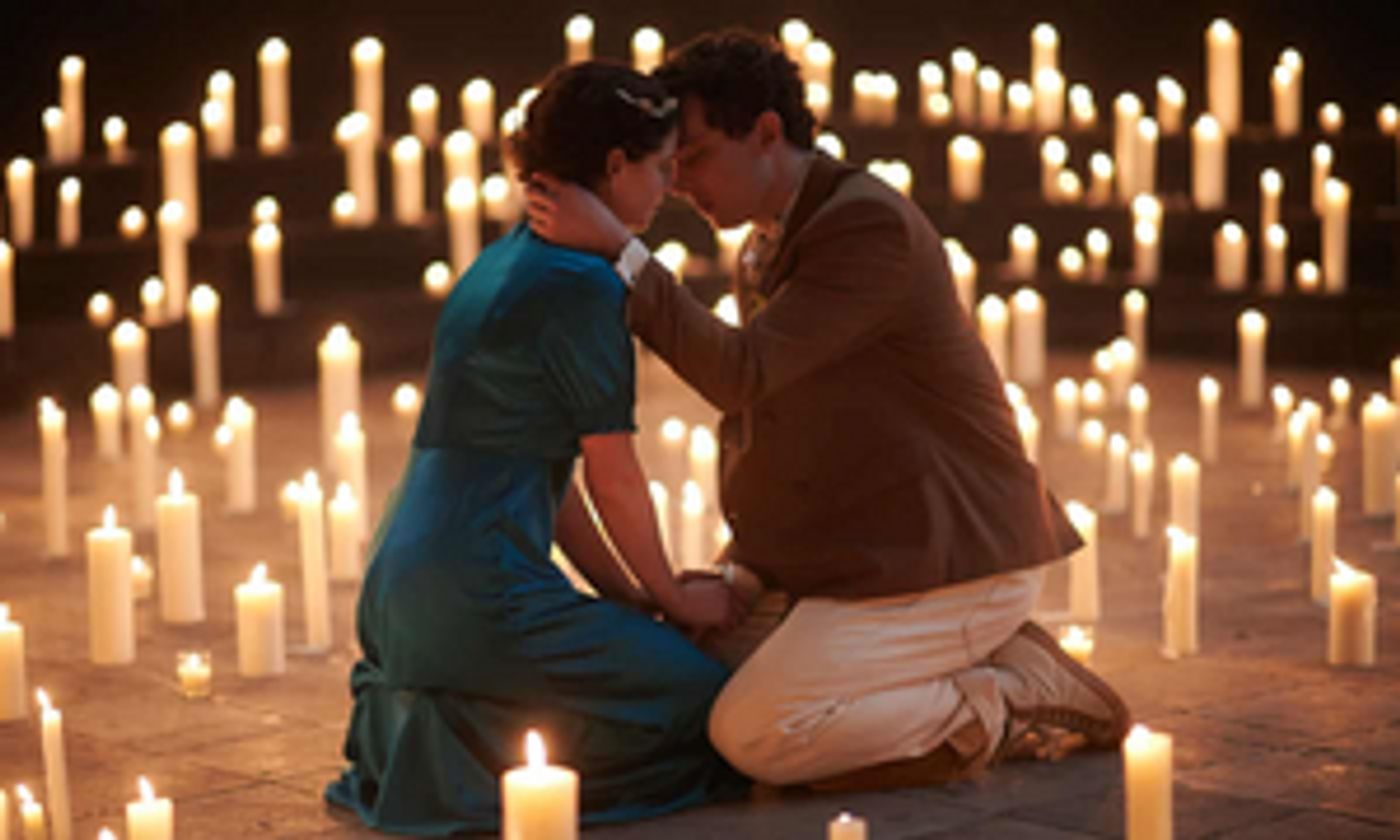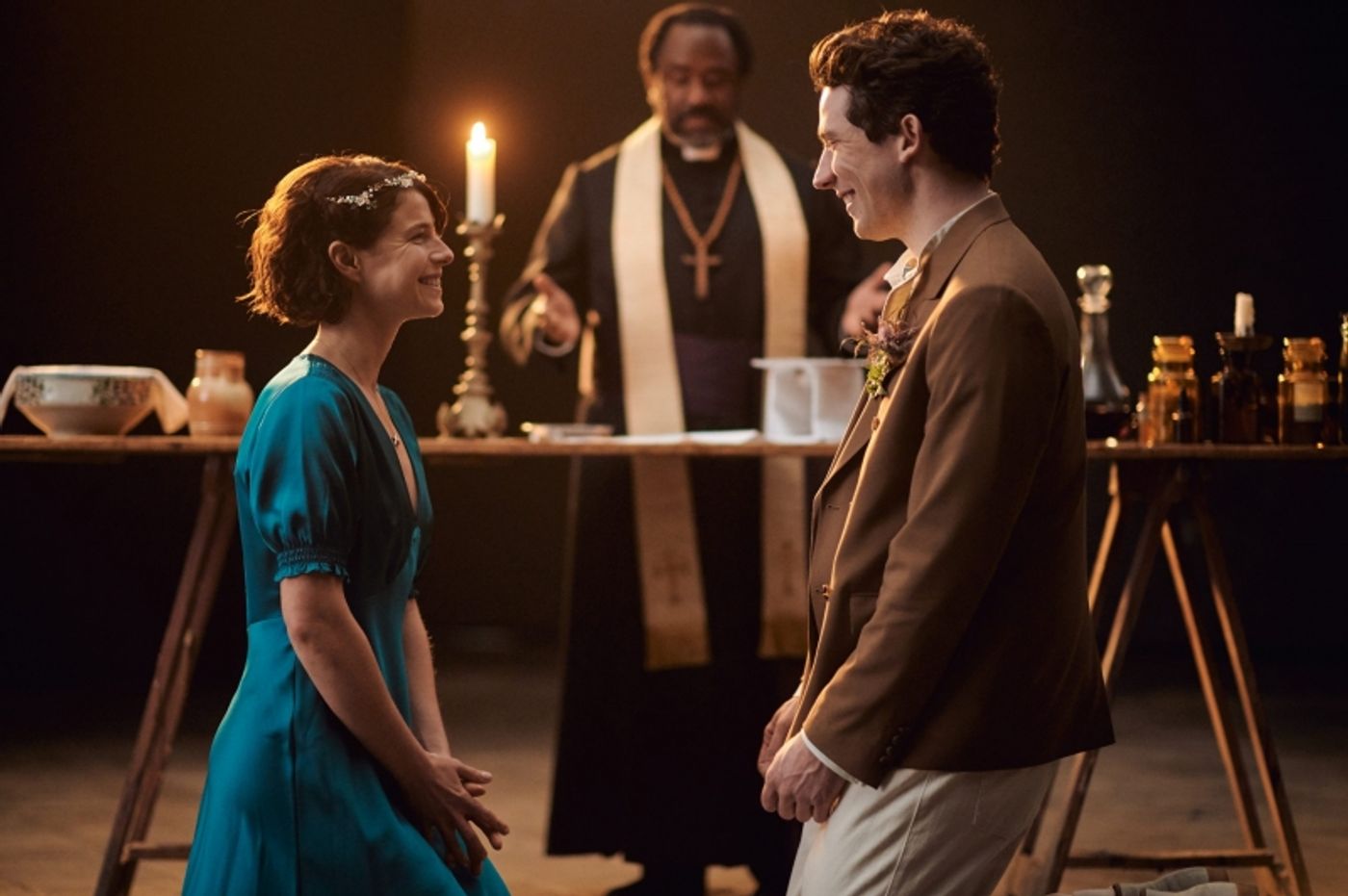Review: Simon Godwin's Production of ROMEO AND JULIET
Godwin and adapter Emily Burns thus earn the highest praise for deriving so handsome a virtue from so dire a necessity.

Photo by Sky UK.
The thing about Romeo and Juliet - but you know this, Grasshopper - is that it isn't a love story - not at all, not even a little bit. It is rather a story of desperation, ego and self-regard. Juliet is a thirteen-year-old girl who has just been given the alarming news that she will be forced to marry a man she's never met. Romeo is a melancholy romantic who is in love with love; he falls in love with Juliet almost immediately after his previous eternal soulmate, Rosalind, tells him to go sit on a tack, and you know that if Juliet had turned him down he would have been in love with Hildegard next week. They are consumed by a passion for each other, but in the truest sense it is a passion of convenience, designed to protect them from what they cannot accept.
It is also a story about death: death in death-drunk Verona is delivered violently, on the street or in the courtyard, or subtly, through poison, or through self-slaughter. The ancient enmity between the Montagues and Capulets, of unknown origins but now fueled by arrogance, spleen and pride, is Verona's pandemic; the city's ruler seems to have no function except from keeping the two families from killing each other. Romeo and Juliet is like a chess match played in Hell; all conceivable moves bring disaster on all parties. In this context the passion between the two lovers calls to us because it embraces life; to paraphrase Mario Cuomo, passion is better than killing because life is better than death.
A play like this, though it be more than four hundred years old, is complex enough to allow a director considerable interpretive leeway, and the estimable Simon Godwin, Artistic Director of Shakespeare Theatre Company, is equal to the opportunity. His stripped-down version of the play - the "two hours traffic of our stage" clocks in at an hour and a half - takes several risks with the text, some of which work brilliantly, others perhaps not so much so. But supplemented by a uniformly excellent cast and sumptuous technical values, the production by London's National Theatre which premiered on PBS on April 23rd (don't worry, I'll give you the link later) is provocative and genuinely moving.
Though you know the story, let's review it so I can identify the actors. Romeo of the House of Montague (Josh O'Connor), having been given the heave-ho by his prior love, seeks to enliven his spirits by attending a party hosted by his familial enemies, Lord and Lady Capulet (Lloyd Hutchinson and Tasmin Greig). There he sees a girl (Jessie Buckley) who makes all his thoughts of Rosalind disappear. What he doesn't know, until later, is that she is the daughter of those same Capulets, and her parents have already told her that she must marry the County Paris (Alex Mugnaion). Their eyes meet, and then their hands touch, and then and there the die is cast. Aided by Juliet's nurse (Deborah Findlay) - here shrewd and affectionate instead of the comic figure she is in most productions - they are secretly married by Friar Lawrence (Lucian Msamati), who hopes that the union will end the seemingly perpetual war between the Montagues and the Capulets.
But Romeo has attracted the choleric attention of Tybalt (David Judge), a Capulet given to murderous rages. Tybalt confronts Romeo and challenges him to combat, but Romeo, being secretly married to a Capulet, refuses to fight a man who is now his kin. Romeo's friend Mercutio (Fisayo Akinade), who is not aware of Romeo's new status, steps up to fight for his friend's honor. As he and Tybalt go at it, Romeo tries to intervene, with disastrous results for Mercutio. Awash in anger and guilt, Romeo flies after Tybalt...and kills him.

Photo by Rob Youngson.
Then his troubles begin.
By far the most spectacularly successful aspect of this production is Godwin's decision to stage the entire play within the confines of the National's capacious theater building. The National had originally intended to do the play live in the summer of 2020, but the pandemic laid those plans to waste. So instead they filmed the production, using every available space - rehearsal rooms, offices, small empty corridors - to create the universe of the play. Even a large empty storage room, probably in the basement, serves as Mantua, the land to which Romeo is exiled after killing Tybalt.
Godwin and adapter Emily Burns thus earn the highest praise for deriving so handsome a virtue from so dire a necessity. Perhaps surprisingly, the effect of utilizing the whole National building space is to make the world of the play more claustrophobic than it is on stage. Even though the stage - any stage - is a much smaller space than the National building, it seems larger. The experience of theatergoing conditions us to open up the stage space with our imagination. We conjure a journey of many miles as Romeo flees Juliet's bedchamber and goes to Mantua, even though he simply exits the stage right door and emerges from stage left, or vice versa. But with film, what we see is what we get. Here, when Romeo flees his wife and runs to Mantua, we see him boxed in by concrete, leaping to stare out the slit windows, cornered and trapped, as all the characters are.
The production is in modern dress, which allows Godwin to play with the text in interesting ways. Brilliantly, he transposes Lady Capulet's lines with those of Lord Capulet, making Juliet's mother the prime mover in Juliet's forced marriage, and thus the person most responsible for her daughter's misery. This powerfully transforms, and increases, the pressure on Juliet. The traditional interpretation of Lord Capulet has him loud, bombastic and prone to lunatic anger, and Juliet in his presence is often like someone in the presence of a family pet who tends to bite when upset. But in Greig's fabulous take on the role, Lady Capulet is a dagger sheathed in ice, as ruthless as Lady Macbeth, but with more resources. The scene in which she explains the consequences of disobedience to Juliet is wonderfully compelling. She is dispassionate, relaxed, and as impervious to argument as a tsunami is, and as she goes on she reveals her true emotional state: one of indifference, to the feelings of Juliet, or anyone else. (Hutchinson's Lord Capulet, on the other hand, takes on the aspect of someone constantly trying to turn down the temperature - think Albany in King Lear.)
Grieg's shark-like Lady Capulet feeds Buckley's jittery Juliet, which in turn gives impetus to the whole production. Every moment Juliet is on stage the subtext seems to be next! next! next! as she struggles to escape both her terrifying mother and the loveless future she has planned for her. This serves not only the text but the stripped-down production, in which we move from event to event with bone-shaking speed.
O'Connor's Romeo, on the other hand, seems languid - a choice justified by the text, certainly, but at variance with traditional interpretations. Romeo is constantly in a state of ecstasy (when he is in love) or agony (when he is out of love or, as he puts it, "out of her favor, where I am in love."). He is of no discernible opinion about politics, sport, or the lives of his fellows; his singular concern is his own love life. Such a person is easily manipulated, and Romeo is; O'Connor emphasizes the character's passivity, and thus makes him a good counterpart to the ever-urgent Juliet.
Some of Godwin's other choices seem more problematic. He makes Mercutio openly gay, and has him make out with Romeo's friend and cousin Benvolio (Shubham Saraf) while Romeo and Juliet canoodle. The text hints at Mercutio's gayness, but the poignancy of it is that it can never be satisfied while he lives in the world of the play. In Mercutio's Queen Mab speech (here shortened considerably), which means to mock Romeo's love for Rosalind, he becomes agitated and fragile; he wants to be Rosalind, and knows he never can. Reconceived as a man with a robust, reciprocated relationship with another man, Mercutio ceases to be tragic, and becomes merely antic.
Even more unfortunate, at least in my view, is the decision to periodically remind us that we are watching a play. The production begins in the rehearsal room, with the cast gathered round as though they are at a table reading (but no table, and no reading; everyone is off book). The Prince (Adrian Lester, doing excellent work) delivers the prologue, and the actors get up and begin to move about the room; Benvolio and Tybalt have their initial confrontation, and we are on our way. But now and again the world of the play breaks down and we are once again reminded of the theatrical endeavor. (I am thinking particularly of a scene in Juliet's bedroom, where she delivers a monologue while surrounded by the cast, sitting in chairs.)
The mission of theater, and all storytelling, is to take us from the mundane world to the world of the story - to allow us to enter the fictive dream. The plays which succeed the best, it seems to me, are those which keep us out of all other worlds, including our own, or the world in which the actors create the play. Romeo and Juliet can serve as a springboard to a play about theater - Joe Calarco's Shakespeare's R+J is about four prep-school boys who decide to rehearse the play in secret, and discover a different type of forbidden love. But even in that play, the story is about the fictional young men; the actors playing them disappear.
I have a few other quibbles - by substituting sticks and switchblades for swords, the play significantly shortens the combat scenes, crucially diminishing the tragedy of Romeo's clumsy intervention in the fight between Mercutio and Tybalt; and the occasional flicker between story present and story future seems overstated and confusing at the same time - but these dissatisfactions are relatively minor. What stands out is Tim Sidell's gorgeous cinematography, Michael Bruce's lovely score; truthful, coherent performances and a powerful narrative line. If you love this play, as I do, in all its longwinded glory (a traditional performance will run in excess of three hours, and include an intermission) there is much you will miss in this production, but much that you will still love.
To see the National production of Romeo and Juliet through May 21 (2021) no cost, go here.
Reader Reviews
Videos

